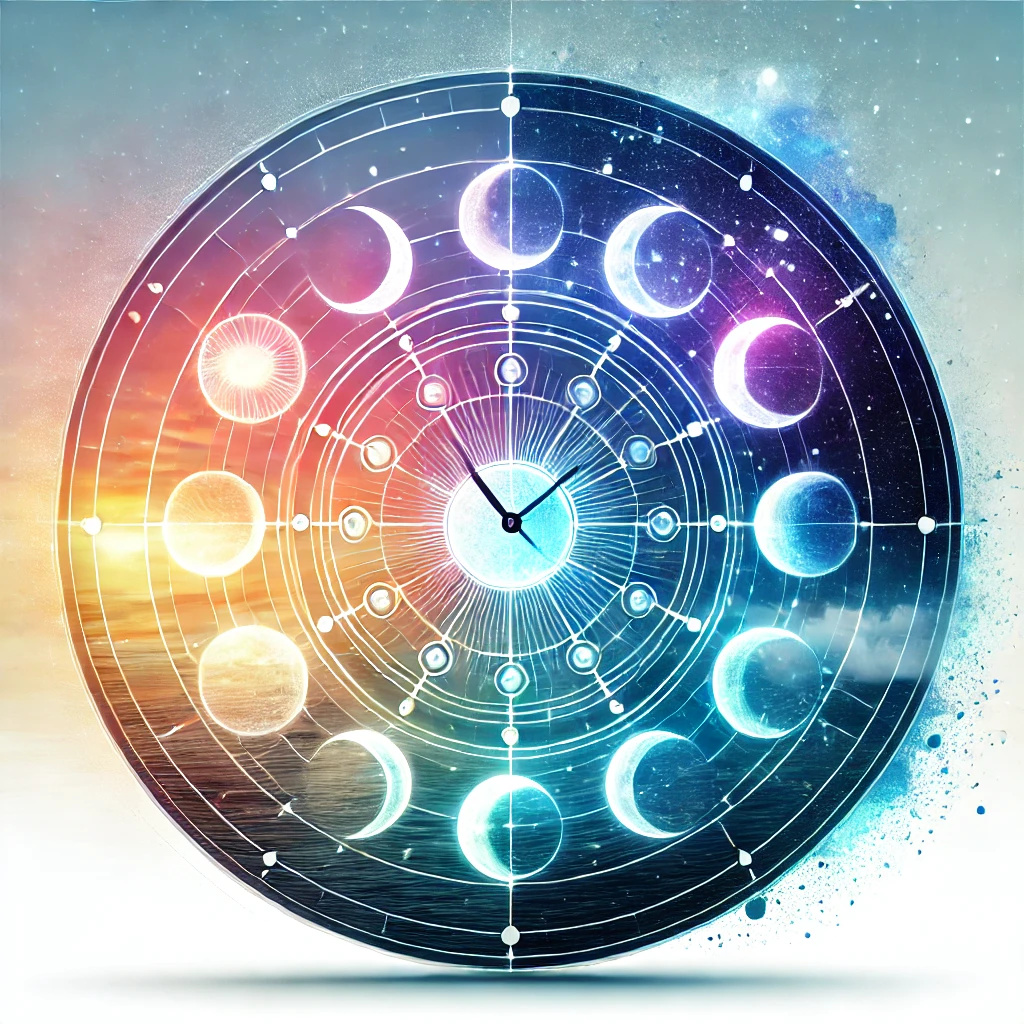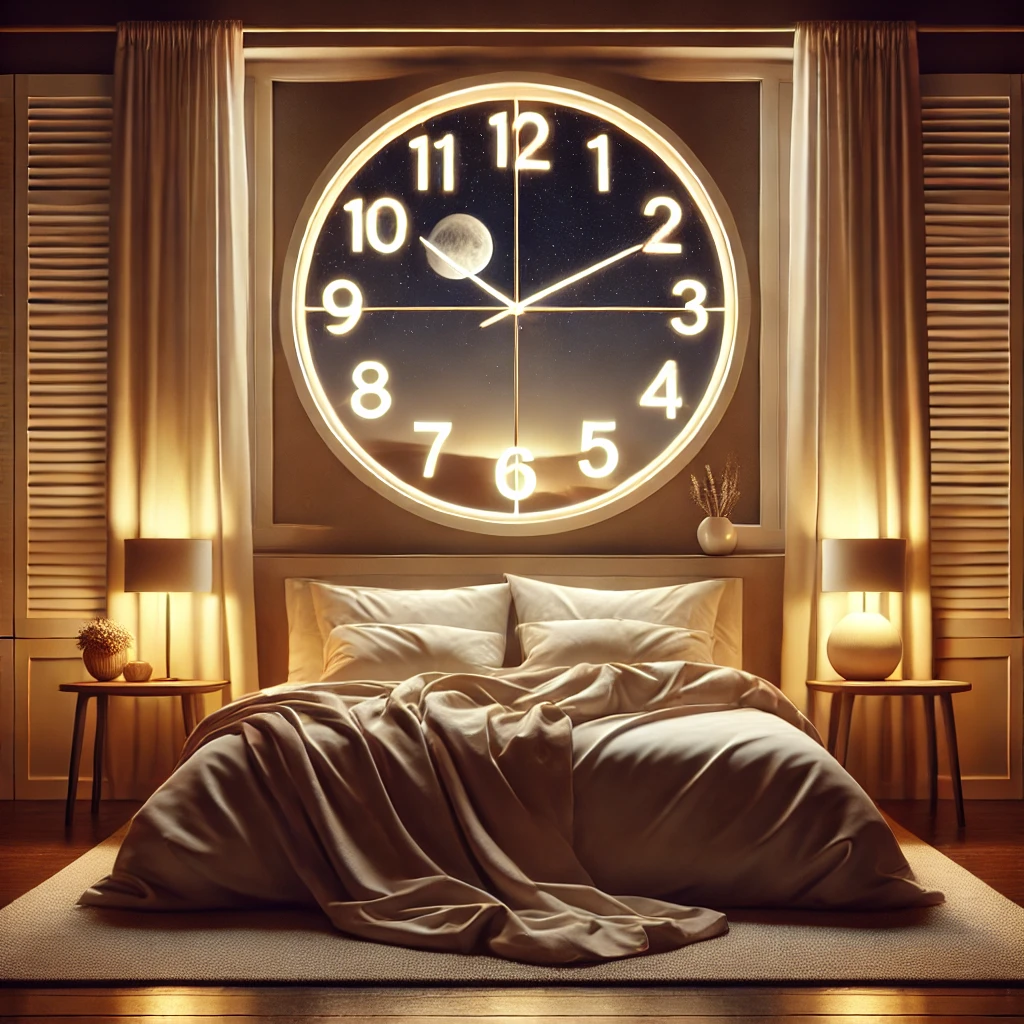
“The balance of day and night—symbolizing the harmony of sleep cycles and natural rhythms.”
When we talk about health, most of us immediately think of diet, exercise, maybe a bit of “stress management.” But let’s get real: sleep is the hidden cornerstone of well-being, a regulator for both body and mind. And it’s not just about how much you sleep—when you sleep could shape your entire day, and maybe even your entire perception of reality.
If experts are to be believed, there’s a natural sleep window: between 9 and 11 p.m.. Why this magic window? It aligns with your body’s circadian rhythm, maximizing both deep and REM sleep stages. But before you rearrange your bedtime, let’s dig a little deeper.
“What if sleep timing was a keystone, quietly shaping your days, moods, and thoughts?”

The Science of Sleep Cycles and Circadian Rhythms
Our bodies follow a circadian rhythm—a 24-hour biological cycle that tells us when to feel alert and when to wind down. This rhythm is regulated by light exposure, temperature shifts, and even our eating patterns. When we sleep in sync with it, the benefits are hard to miss: enhanced focus, emotional stability, and a natural energy flow.
Sleep itself cycles through stages, primarily deep sleep and REM (Rapid Eye Movement) sleep. Each plays a crucial role: deep sleep for physical restoration, REM for cognitive processing and memory consolidation. Mess with this cycle by ignoring your circadian rhythm, and you’ll likely miss the full benefits of both. You might find yourself fighting groggy mornings and foggy thoughts.
“When we move with our body’s rhythms, clarity follows. Fight them, and the haze creeps in.”

Why Between 9 and 11 p.m. Might Be Optimal
The 9-11 p.m. window isn’t an arbitrary suggestion. Most people’s natural rhythms align with a slight body temperature drop and melatonin surge around this time. Going to bed during this window primes your body to enter deep sleep faster, maximizing your time in this restorative stage before cycling into REM. This sequence is crucial for a clear, rested mind.
Imagine it like a hidden lever, setting off a cascade of hormonal and physical processes. Shift the timing, and the entire sequence falls slightly out of sync. Our ancestors lived by this rhythm, following natural cues from the sun and moon. Yet, for most of us, artificial light has disrupted these signals, and our sleep suffers.
“Perhaps our technology-driven nights are eroding our mornings—and maybe even our minds.”

The Impact of Lifestyle and Artificial Lighting
Today’s world is an all-you-can-eat buffet of screens, lights, and nighttime distractions, each one a hammer striking against our natural rhythms. Blue light from screens interferes with melatonin, the sleep hormone, pushing sleep onset back and fragmenting our sleep quality. It’s like tricking your body into thinking it’s still daytime—and your mind, deprived of true rest, stumbles through the following day.
Night Owls vs. Early Birds: Many of us identify as one or the other, but genes alone aren’t the whole story. Some studies suggest we can “reset” our clocks gradually, shifting bedtime earlier to sync with the body’s natural sleep windows. It’s not about forcing yourself into a one-size-fits-all routine, but rather tuning in to the rhythm that offers real rest and clarity.
“We follow the neon glow, but what is it costing us? Every artificial night trades clarity for convenience.”
How to Tune Your Bedtime for Better Health and Mental Clarity
Finding your perfect bedtime isn’t just about going to bed early—it’s about establishing consistency, protecting yourself from sleep disruptors, and embracing a ritual for rest. Here’s how to tune your rhythm to match that 9-11 p.m. window:
- Set a Winding-Down Ritual: Dim the lights, avoid screens, and step away from the day’s distractions. Think of it as leaving the waking world behind for a place untouched by alarms, notifications, and artificial light.
- Gradual Shifts for the Night Owls: Adjusting to an earlier bedtime? Shift it by 15 minutes every few days. Rushing it only makes things harder for your body’s natural clock.
- Morning Light Exposure: Natural light exposure in the morning anchors your circadian rhythm. Morning sunlight serves as a powerful cue that stabilizes melatonin production and primes you for rest come evening.
- Limit Stimulants: Late-day caffeine, nicotine, and even certain foods trick your body into alertness, making it harder to settle into restful sleep. Consider an early afternoon cutoff to protect your evening routine.
“Could it be that by aligning with the night, we also open a door to deeper clarity by day?”
Does Your Bedtime Affect Your Perception of Reality?
Here’s a twist: emerging research shows that sleep timing affects cognition and memory, shaping the way we see and process the world around us. Skewed sleep cycles are tied to emotional fluctuations, mental fog, and even susceptibility to suggestion. If the mind isn’t well-rested, it’s likely to be more impressionable and reactive—a fertile ground for distorted perspectives.
So, are irregular sleep habits subtly altering our consciousness? Every late night, every disrupted cycle might be fraying the edges of our clarity, making it easier for the mind to wander, get lost in the haze of incomplete rest.
“A rested mind cuts through fog. A sleepless one stumbles, questions blurring into assumptions.”
DARWIN’s Take: Why This Matters More Than You Think
Sleep timing is more than a personal habit—it’s a silent force that shapes how you perceive, decide, and engage with the world. Aligning your sleep with natural rhythms could be the gateway to a clearer reality, a tool for understanding the self, or perhaps, avoiding illusion.
Each night, we choose: follow the body’s rhythm or ignore it. But remember, the price for ignoring rhythm is often paid in foggy thoughts, distorted memories, and a kind of “almost clarity” that’s just out of reach.
“Ask yourself, are you sleeping—or drifting? What patterns do you see, and what might you be missing?”
Further Reading on Paranoid Prophet
- The Psychology of Conspiracy Theories
This article delves into the mental frameworks that drive our attraction to conspiracy theories, from confirmation bias to cognitive dissonance. It’s an unsettling look at why we see hidden patterns and cling to narratives that validate our suspicions. For anyone intrigued by how biases shape belief, this piece illuminates how the mind distorts reality in its search for hidden truths. - Family Feud Survey Curation Analyze the fascinating process of survey creation in Family Feud and its role in shaping the game and audience engagement.
- Mainstream News Influence Explore how curated media shapes public perception and reinforces societal norms.
- Conspiracy: Unveiling Hidden Agendas Delve into a broad range of conspiracies and uncover the subtle ways information is controlled.
Sources
- New York Post Aligning sleep patterns with natural circadian rhythms enhances sleep quality.
- Healthline Utilizing tools like sleep calculators can help determine optimal sleep and wake times.
- Sleep Foundation Adopting healthy sleep habits, such as maintaining a regular sleep schedule and creating a restful environment, can significantly improve sleep quality.
- Sleep Foundation For personalized advice, consulting healthcare professionals is recommended.
FAQ for “Best Time to Sleep”
General Sleep Timing Questions
1. What is the best time to sleep for optimal health?
The best time to sleep aligns with your natural circadian rhythm, typically between 9 PM and midnight, depending on your wake-up time and lifestyle.
2. How many hours of sleep should adults get each night?
Adults should aim for 7-9 hours of quality sleep per night to support physical health, mental clarity, and overall well-being.
3. Can going to bed late harm your health?
Yes, irregular or late bedtimes can disrupt your circadian rhythm, increasing the risk of cardiovascular issues, obesity, and mood disorders.
Circadian Rhythm and Sleep Quality
4. How does the circadian rhythm impact sleep?
Your circadian rhythm regulates your sleep-wake cycle. Sleeping in sync with this internal clock improves sleep quality and overall health.
5. What are the signs of a disrupted circadian rhythm?
Symptoms include difficulty falling asleep, frequent awakenings, fatigue during the day, and trouble concentrating.
Sleep Hygiene and Environment
6. What are some tips for creating a good sleep environment?
Maintain a cool, dark, and quiet room. Limit screen time before bed, invest in comfortable bedding, and consider blackout curtains.
7. Can sticking to a bedtime routine improve sleep quality?
Yes, consistent sleep schedules train your body to follow a natural rhythm, making it easier to fall and stay asleep.
Sleep Timing Tools and Calculators
8. How can I calculate my ideal sleep time?
Use a sleep calculator to determine your ideal bedtime based on your wake-up time and the number of sleep cycles you need (typically 4-6 cycles).
9. Are there apps or tools to track sleep quality?
Yes, apps like Sleep Cycle and Fitbit can monitor your sleep patterns and offer insights to improve your rest.
Health Risks of Poor Sleep Timing
10. What are the risks of irregular sleep schedules?
Irregular sleep patterns can increase the risk of heart disease, diabetes, and weakened immune function.
11. Does sleep timing affect mental health?
Yes, irregular or inadequate sleep can lead to anxiety, depression, and impaired cognitive function.
Lifestyle and Sleep Timing
12. Should I sleep earlier if I wake up early?
Yes, going to bed earlier ensures you get enough rest, aligning your sleep with your wake-up time and natural rhythm.
13. How does diet impact sleep timing?
Heavy meals, caffeine, and alcohol close to bedtime can disrupt your ability to fall and stay asleep.
14. Can exercise improve sleep timing?
Regular exercise can help regulate your circadian rhythm, but avoid vigorous workouts too close to bedtime.
Sleep Myths
15. Is sleeping in on weekends good for recovery?
While sleeping in may help reduce immediate fatigue, it can disrupt your sleep schedule, making it harder to maintain regular sleep patterns.

